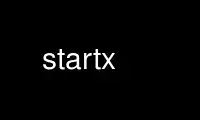
This is the command startx that can be run in the OnWorks free hosting provider using one of our multiple free online workstations such as Ubuntu Online, Fedora Online, Windows online emulator or MAC OS online emulator
PROGRAM:
NAME
startx - initialize an X session
SYNOPSIS
startx [ [ client ] options ... ] [ -- [ server ] [ display ] options ... ]
DESCRIPTION
The startx script is a front end to xinit(1) that provides a somewhat nicer user interface
for running a single session of the X Window System. It is often run with no arguments.
Arguments immediately following the startx command are used to start a client in the same
manner as xinit(1). The special argument '--' marks the end of client arguments and the
beginning of server options. It may be convenient to specify server options with startx
to change on a per-session basis the default color depth, the server's notion of the
number of dots-per-inch the display device presents, or take advantage of a different
server layout, as permitted by the Xorg(1) server and specified in the xorg.conf(5)
configuration. Some examples of specifying server arguments follow; consult the manual
page for your X server to determine which arguments are legal.
startx -- -depth 16
startx -- -dpi 100
startx -- -layout Multihead
Note that in the Debian system, what many people traditionally put in the .xinitrc file
should go in .xsession instead; this permits the same X environment to be presented
whether startx, xdm, or xinit is used to start the X session. All discussion of the
.xinitrc file in the xinit(1) manual page applies equally well to .xsession. Keep in mind
that .xinitrc is used only by xinit(1) and completely ignored by xdm(1).
To determine the client to run, startx first looks for a file called .xinitrc in the
user's home directory. If that is not found, it uses the file xinitrc in the xinit
library directory. If command line client options are given, they override this behavior
and revert to the xinit(1) behavior. To determine the server to run, startx first looks
for a file called .xserverrc in the user's home directory. If that is not found, it uses
the file xserverrc in the xinit library directory. If command line server options are
given, they override this behavior and revert to the xinit(1) behavior. Users rarely need
to provide a .xserverrc file. See the xinit(1) manual page for more details on the
arguments.
The system-wide xinitrc and xserverrc files are found in the /etc/X11/xinit directory.
ENVIRONMENT VARIABLES
DISPLAY This variable gets set to the name of the display to which
clients should connect. Note that this gets set, not read.
XAUTHORITY This variable, if not already defined, gets set to
$(HOME)/.Xauthority. This is to prevent the X server, if not
given the -auth argument, from automatically setting up insecure
host-based authentication for the local host. See the Xserver(1)
and Xsecurity(7) manual pages for more information on X
client/server authentication.
Use startx online using onworks.net services
